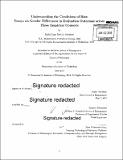Understanding the conditions of bias : essays on gender differences in evaluation outcomes across three empirical contexts
Author(s)
Abraham, Mabel Lana Botelho
DownloadFull printable version (12.67Mb)
Other Contributors
Sloan School of Management.
Advisor
Roberto Fernandez.
Terms of use
Metadata
Show full item recordAbstract
This dissertation contributes to our understanding of when and how gender is incorporated into the evaluation of individuals, leading to unequal outcomes for similar men and women. Prior research has shown that because ascriptive characteristics, such as gender, are associated with widely-held performance expectations, evaluators often rely on gender as an indicator of quality, particularly when quality is uncertain or indeterminate. Whereas existing research has importantly documented that gender differences in evaluation outcomes exist, this dissertation shifts the focus to uncovering the conditions under which this is the case as well as the underlying mechanisms driving these observed gender differences. Specifically, the three papers in this dissertation contribute to our understanding of the evaluative mechanisms perpetuating gender inequality by answering the following overarching research question: Under what conditions and how do evaluation processes lead to different outcomes for comparable men and women, particularly when more relevant indicators of quality are available to evaluators? I draw on data from three distinct empirical contexts to examine when and how evaluations of similar men and women vary within social networks, a financial market setting, and an organization. I pay particular attention to the often levied criticism of gender inequality research, namely failure to adequately account for underlying quality or performance differences. I show that the gender of the evaluatee, or the individual being evaluated, plays a role beyond serving as a proxy for missing quality information and that male and female evaluators incorporate gender differently under certain conditions.
Description
Thesis: Ph. D., Massachusetts Institute of Technology, Sloan School of Management, June 2015. Cataloged from PDF version of thesis. Includes bibliographical references (pages 147-164).
Date issued
2015Department
Sloan School of ManagementPublisher
Massachusetts Institute of Technology
Keywords
Sloan School of Management.